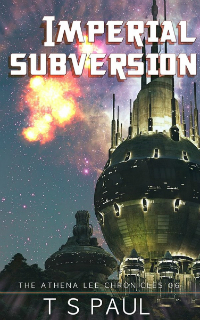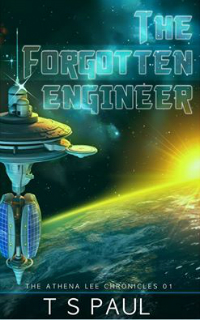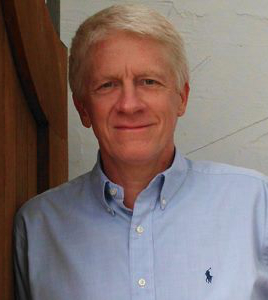
Author T.S. Paul joins us this week to discuss the success he’s had selling his short fiction.
Podcast: Play in new window | Download | Embed
Subscribe Apple Podcasts | Android | RSS
Swim upstream. Go the other way. Ignore the conventional wisdom.
—- Sam Walton
 One of the concerns every business must handle is dealing with incoming information flow. There is a torrent of information coming at us from all directions, seemingly at all times.
One of the concerns every business must handle is dealing with incoming information flow. There is a torrent of information coming at us from all directions, seemingly at all times.
One shortcut to dealing with information overload is to simplify it into easily understood bits and then ignore what doesn’t fit our expectations. When enough of us see and discuss a pattern, conventional wisdom is formed, allowing us to “know” things are true without actually testing the data.
One bit of conventional wisdom that I accepted early on in my author business was that it’s tough or maybe even impossible to make money selling short fiction. Oh sure, there are the occasional Kindle Singles that sell well for big time authors introducing a new series character, but in general, you can’t make any real money selling short fiction.
When I first heard the story of today’s guest, T.S. Paul, I scoffed and rejected it as an exaggeration. Then I looked more closely. According to the Amazon rankings, T.S. Paul was selling a lot of short books. His first was 62 pages, his second was just over 30 pages, and they both ranked in Amazon’s overall top 2,500.
 But conventional wisdom is tough to overcome. I reached out to T.S. (Scott) Paul, and we discussed his numbers. He gave me access to his sales numbers. I compared what he was doing, and the results he was seeing to conventional wisdom and realized I’d been wrong.
But conventional wisdom is tough to overcome. I reached out to T.S. (Scott) Paul, and we discussed his numbers. He gave me access to his sales numbers. I compared what he was doing, and the results he was seeing to conventional wisdom and realized I’d been wrong.
Scott has published six books and two compilations, of three books each in less than 90 days. He priced the books at $2.99 so he could be paid for his work. He refuses to give his books away, and he’s making real money.
In this 35 minute interview, we discuss Scott’s history as a retail bookstore manager, his brief history as an author and the results he’s seeing by writing short fiction for a growing audience of readers and fans.
Short Fiction Interview Notes
Scott shares his background as a manager at multiple Waldenbooks locations in the St. Louis area and what the experience taught him about selling books at the retail level.
 We discuss the process he went through to write and publish THE FORGOTTEN ENGINEER, the first book in The Athena Lee Chronicles series. (According to Amazon, the first book in the series, contains 62 pages.)
We discuss the process he went through to write and publish THE FORGOTTEN ENGINEER, the first book in The Athena Lee Chronicles series. (According to Amazon, the first book in the series, contains 62 pages.)
Book two in Scott’s series, ENGINEERING MURDER is 34 pages and is a category #1 best seller at Amazon.
We discuss Scott’s reviews and his unusual thoughts on their lack of importance to his success.
Scott shares his simple pricing strategy. He prices all of his books, ranging from 32 pages – 148 pages at $2.99. His collections, which combine three books cost $7.99.
Scott uses his blog to keep readers engaged between the short, two-week release schedule for his books by posting a series he calls Wilson Wednesdays.
We discuss Scott’s initial expectations for his series, and how those expectations have evolved in three short months.
Links:
TS Paul Author Page at Amazon
Scott’s website: http://tspaul.blogspot.com/
Rocking Self Publishing Episode 148
Thanks for Listening!
Thanks so much for joining me again this week.
If you enjoyed this episode, please share it using the social media buttons you see on the left of the post.
Also, please leave an honest review for The Author Biz Podcast on iTunes!
Ratings and reviews are extremely helpful and mean a great deal to me. They matter in the rankings of the show, and I read every one of them. If you’re not sure how to leave an iTunes review, you can follow the step-by-step instructions here.
And finally, don’t forget to subscribe to the show on iTunes or Stitcher to get automatic updates.
Thanks to T.S. Paul for joining us this week!

 Before getting into the business of writing I spent twenty-five years in the technology business as a financial guy, and then as a serial entrepreneur. I know what it takes to start and run a successful business.
Before getting into the business of writing I spent twenty-five years in the technology business as a financial guy, and then as a serial entrepreneur. I know what it takes to start and run a successful business.
Steve, Fascinating show. It basically challenges all my beliefs…Time to rethink? Possibly. As you put it, “Shattering my illusions.” Many thanks
Thank you, Mike! The pricing thing was a big surprise to me. It looks like you’ve been busy – Two Dev’s last week, one of which was a Novella. Congrats on your continued success.
To think that I almost deleted this e-mail without listening because it sounded so improbable. Thanks for doing this interview!
Thanks, Laurel – I felt the same way when I first heard the story. It’s fun for me to have my illusions shattered.
Great and inspiring episode, Steve. Disillusionment is always to be welcomed. BTW, I use Open Office and it works fine; just set up margins and format first. Then one click to PDF for print, then “Default Formatting” and save as HTML for Kindle/Nook (two clicks — well, three to select HTML). Pizza cake.
Thanks, Jake – I’ll admit to not really understanding the problems Scott had with Open Office, but since it wasn’t germain to the interview, I didn’t follow up. I’m a Scrivener user myself. Love it. Pizza cake 😉
Great interview. Sounds like there’s hope for short-fiction writers. I could see taking his methods and refining them a bit to see what happens, but I love the gung-ho attitude.
One thing, though. When people talk about “pages,” I don’t know what that means anymore. What is 30 pages? Kindle pages? Word pages? Single or double spaced? In other words, how many words is that?
Hi Erik,
That’s an interesting question, and the answer is it depends on who you’re talking to. In the interview, Scott mentioned the page numbers that Amazon assigned to his books, which they somehow equate to actual pages in a printed book. My most recent book is a collection of four short stories – total word count roughly 25,000. Amazon calls that 84 pages on my book page.
It varies. My first book was about 12k and it came out to 60 pgs, the second was around 10k and it was 34 pgs. Book 3 was 22-23k at 108 pgs, the new one was about 16k for 70 pgs Sometimes I think it is totally up to the Amazon Gods.
You can also checkout http://penpee.com – a platform to read short stories, write and get paid each time someone new read a chapter of your story.
Creators can publish stories that consist up to 8,400 words, spanning over 5 chapters, depending on membership plan and will be paid when readers finish each chapter. This means that authors earn money by the chapter and not by book, so they get to have the flexibility to upload chapters at their own pace.